 MyDogBreeds
MyDogBreeds Shikoku is originated from Japan but Chihuahua is originated from Mexico. Both Shikoku and Chihuahua are having almost same height. Shikoku may weigh 49 kg / 109 pounds more than Chihuahua. Shikoku may live 5 years less than Chihuahua. Both Shikoku and Chihuahua has almost same litter size. Shikoku requires Moderate maintenance. But Chihuahua requires Low maintenance
Shikoku is originated from Japan but Chihuahua is originated from Mexico. Both Shikoku and Chihuahua are having almost same height. Shikoku may weigh 49 kg / 109 pounds more than Chihuahua. Shikoku may live 5 years less than Chihuahua. Both Shikoku and Chihuahua has almost same litter size. Shikoku requires Moderate maintenance. But Chihuahua requires Low maintenance
 The Shikoku is from the Shikoku Island in Japan and they are very much like the Japanese Shiba Inu. There are six native Japanese dog breeds and the Shikoku is medium sized and sits in between the smaller Shiba Inu and the very large Akita Inu. All of the Japanese native breeds are members of the Spitz family. The Japanese have sorted their six breeds into 3 categories by size. Being medium size, the Shikoku is a member of the Shika-inus group. Others in this group are the Ainu Ken, the Kai Ken and the Kishu Inu. There are small differences between the three dogs in the Shika-inus group.
The Shikoku is from the Shikoku Island in Japan and they are very much like the Japanese Shiba Inu. There are six native Japanese dog breeds and the Shikoku is medium sized and sits in between the smaller Shiba Inu and the very large Akita Inu. All of the Japanese native breeds are members of the Spitz family. The Japanese have sorted their six breeds into 3 categories by size. Being medium size, the Shikoku is a member of the Shika-inus group. Others in this group are the Ainu Ken, the Kai Ken and the Kishu Inu. There are small differences between the three dogs in the Shika-inus group.
The Shikoku was bred to be a hunting dog in Kochi Prefecture to hunt boar and deer. Other names for the breed include Kochi-ken and Kishu dog or boar hound. This dog is considered to be the purest of the Japanese native dogs or Nihoken. They are today very , very rare. There are very few outsides of Japan, but some in North America are attempting to save the breed.
The are od Kochi Prefecture is a mountainous region with rough terrain that anyone outside of the area would have a hard time accessing. That is why the Shikoku is considered to be so pure as they were pretty well isolated in the mountains. The breeders were also isolated by the mountains and there was very little interbreeding. Although breeding the same dog, these different groups developed different lines of the Shikoku.
Documentation tells us that the number of originals lines was just two and these were the Western and Eastern Shikoku. The Western dog was known as the Mount Ishizuchi Shikoku and the Eastern as the Mount Tsurugi Shikoku. Within these two lines of Shikoku there are additional strains.
Within the Eastern line there is the Tokushima (lya) and the Koci-Aki strains. Within the Western line there is the Hata Uwahara, the Ehime-ken Shuso-gun and the Honkawa. Among these lines and strains, there are different coats and different colors; some heavier and some taller, but all figure into the development of the breed.
Finally, in the Showa Era the Japanese established the Dog Protective League and they began collecting the native dogs from around the country. They protected them so that the breed will go on. The Shikoku is today recognized as Foundation Stock by the AKC and it is fully recognized by the Japan Kennel Club, the Canadian Hound Club and the Shikoku has been declared a living Japanese “natural monument”.
Two bloodlines became the way the Shikoku were know after the war – the Honkawa and the Hata lines The Honkawa line were the descendants of the Choshun-go and the Hata line were the descendants of the Matsukaze-go. They bred the lines separately until 1955, when they mixed them to make the breed stronger. They are no longer considered separate in any way.
Because they are such primitive dogs, the Shikoku are good watch dogs and quite reserved with strangers. They need a lot of socialization to be a family pet but once they are, they make great companions. Intelligent, quick to learn and eager to please. Of the two lines of Shikoku dogs from the Western strains, the current Shikoku owes much of its current development to the Honkawa and Hata strains.
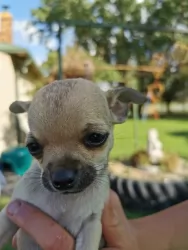 Quite a bit of the Chihuahua’s history is shrouded in mystery, and there are different versions about its origins.
Quite a bit of the Chihuahua’s history is shrouded in mystery, and there are different versions about its origins.
While historians speculate, most will agree that the tiny dog hails from Mexico. The UK Kennel Club considers the smooth- and long coat Chihuahuas as 2 distinct breeds.It was in 1904 that the Chihuahua became a registered breed by the American Kennel Club.
Chihuahua is actually the name of a state in Mexico, and it is amazing that Chihuahua specimens were found way back in the 1800's already. Today the Chihuahua is a very popular dog breed in several countries.
 Today’s Shikoku is a medium sized breed with a Spitz like body – square with a head that is wedge shaped. The ears are pointed, and the tail is curved and feathered. They have arched toes and hard pads with dark, hard nails.
Today’s Shikoku is a medium sized breed with a Spitz like body – square with a head that is wedge shaped. The ears are pointed, and the tail is curved and feathered. They have arched toes and hard pads with dark, hard nails.
The two lines of the Shikoku are slightly different in built and look. The Honkawa strain is slender and athletic; agile and single coated. They have dark eyes and most of them are black and tan.
On the other hand, the Hata strain is much heavier boned, with the front more muscular than the rear. They have small ears, a wide skull and a strong undercoat. His eyes are shaped differently than the Honkawa. Their coats are also mostly red and tan.
 The small Chihuahua stands at about 15 – 23 cm and he weighs about 1,5 – 4kg.
The small Chihuahua stands at about 15 – 23 cm and he weighs about 1,5 – 4kg.
You’ll notice that he shivers when he is excited or when he is cold or frightened. Some people buy him a jersey to don on cooler days. With this tiny toy dog, you get a short- and a long coated Chihuahua.
This is the smallest dog breed and his coat is available in a number of colors such as fawn, tan, white and black. It is the dog’s round apple-shaped head which is a distinctive feature. He has erect ears and huge fruit-bat type eyes.
The Chihuahua is such an alert, fun-loving, feisty little dog, and though he may appear to be an ideal pet for children, he actually isn’t. He is too dainty and frail, and a child, during play, could accidentally crush him.
It’s a pity though because he just loves being around his human family. He is also a highly strung dog, and given the chance, he’ll nip and even bite during games. It is why socialization and training are considered important for the Chihuahua.
Just like with children, how you raise and treat your Chihuahua will determine how he turns out. He is such a sweet little dog that training and socialization can remove these unwanted characteristics. He is very intelligent and responds well to training.
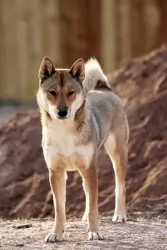 1.Children friendliness – They might be a little aloof with children. They are hunters.
1.Children friendliness – They might be a little aloof with children. They are hunters.
3.Adaptability with your commitment to exercise they can live anywhere even in an apartment.
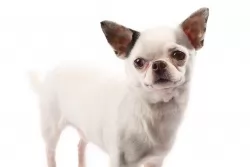 Small and feisty, the Chihuahua’s personality isn’t set in stone, and the tiny dog can be either shy and timid or he can be social, confident and jaunty.
Small and feisty, the Chihuahua’s personality isn’t set in stone, and the tiny dog can be either shy and timid or he can be social, confident and jaunty.
They're always loyal and affectionate to their human owners, but they don’t get on too well with- and are wary of small children who aren’t disciplined and who could hurt them.
With his big eyes and big ears together with his comical antics, they can be a source of entertainment for their human owners. He is easy to train too and even though he is small, he doesn’t think he is, and he is willing to use his big personality to make you a loving, loyal and devoted companion.
 Being isolated as they were, the Shikoku was a fairly healthy breed, no genetic testing has been done. Despite this they suffer a few of the same potential issues as other breeds their size.
Being isolated as they were, the Shikoku was a fairly healthy breed, no genetic testing has been done. Despite this they suffer a few of the same potential issues as other breeds their size.
Otherwise this is an agile and hardy breed with no known congenital health issues.
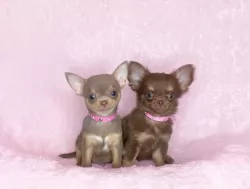 The Chihuahua doesn't have any particular health issues, more so when you get him from a reputable breeder. With good care he can reach 20 years of age.
The Chihuahua doesn't have any particular health issues, more so when you get him from a reputable breeder. With good care he can reach 20 years of age.
Known as low blood sugar, hypoglycemia is easily treatable, but if it isn’t caught early it can be fatal.Hypoglycemia makes a dog lethargic and he’ll shiver and could go into a coma. Get him to the vet immediately.
Gastric Dilatation or bloat is when the stomach twists, it becomes enlarged and blood supply is cut off to the stomach. Left untreated, it can be fatal.
Chihuahuas are susceptible to dental problems, so you will need to brush his teeth 2 or 3 times a week to prevent tartar build-up, gum disease, loss of teeth and other diseases.
 Feeding the puppy Be careful with feeding the puppy and adult as the breed is known to have a tendency toward obesity. Fresh food is better as it is what the breed has been used to, but a high quality puppy kibble is acceptable. Feed three times per day.
Feeding the puppy Be careful with feeding the puppy and adult as the breed is known to have a tendency toward obesity. Fresh food is better as it is what the breed has been used to, but a high quality puppy kibble is acceptable. Feed three times per day.
2.Feeding the adult He is a high energy dog so feed a high energy food designed for a medium sized dog. Feed in two meals each day.
4. Games and Exercises You will need a fenced yard for this breed and time to play with them. If not, you would need time to walk her more than once a day. They love to play indoors as well, chasing balls, learning new things. The breed make great companions for hiking, swimming, play frisbee or catch outside. They do well at agility, rally, obedience and flyball.
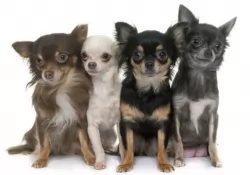 Always make sure to choose a high-quality dog food for your Chihuahua as this will keep him in tip-top health. A healthy Chihuahua can live to be 20 years of age. Speak to a veterinarian for recommendations on the best type of food to feed your tiny pet.
Always make sure to choose a high-quality dog food for your Chihuahua as this will keep him in tip-top health. A healthy Chihuahua can live to be 20 years of age. Speak to a veterinarian for recommendations on the best type of food to feed your tiny pet.
Giving him some home-made food such as brown rice, vegetables and cooked chicken for instance will be a welcome treat for him. Make sure he always has a bowl of fresh, cool water close by.
The Chihuahua may well be the smallest toy sized dog breed, but don’t be mistaken – he has plenty of energy and is constantly prancing around. He is more than capable of living in a small apartment, but even so he needs to be taken outside every now and then for a game or a walk.
Be careful with your small pet though, as too much exercise can lead to elbow- and hip dysplasia.
The Chihuahua is a moderate shedder with Spring being their heavier shedding period. Because of his small size, you won’t be bothered by too much hair. The short haired Chihuahua is easy to maintain and with a rubber brush, you can brush him gently twice a week.
You’ll also need to clip his nails and if you can’t manage this your vet can also help you.